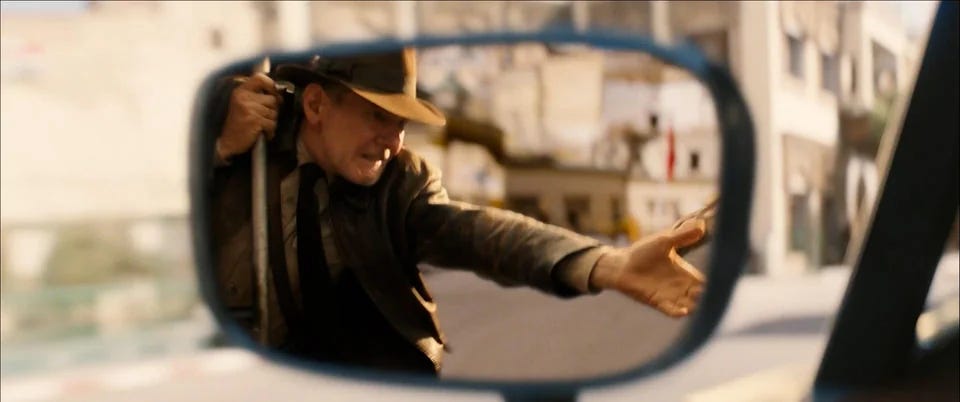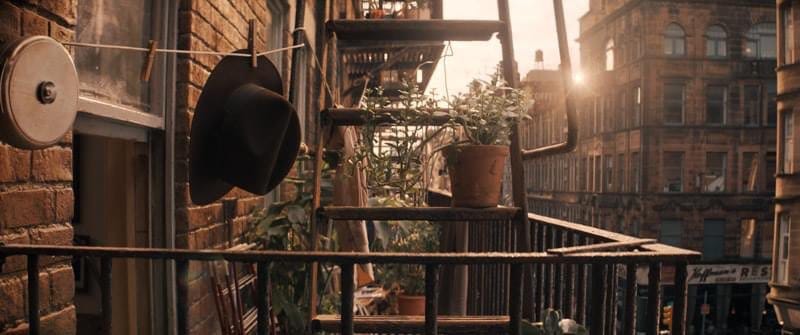Don't Go, We Still Need You
Indiana Jones: The Dial Of Destiny and belonging
Indiana Jones does not belong here. That’s what we’re made to feel in The Dial Of Destiny, the fifth and final installment of Indiana Jones starring Harrison Ford. I phrase it like this because we all know they’ll recast and reboot, eventually. Indiana feels his age in his old bones throughout the movie, the reality is that the civilized world has moved on from the days of fascination with the ruins beneath our feet and instead is looking to the stars. It’s 1969, baby.
He stares menacingly at a child on the subway dressed as an astronaut. Indy moves past breaking news on TV of the moon landing with total disinterest. Is it that Indy doesn’t care about space exploration and modernity, or does he feel hurt that the world barely notices him anymore?
You get this impression when Dr. Henry (Indiana) Jones is lecturing in front of students at the university, as he has long done throughout the franchise. Only in past films, the students hung on his every word and crowded his office for insights and feedback on their research. In The Dial of Destiny, students hardly know he’s there and could care less for his lectures on the dusty past.
All save one “student” in the back of the class, Helena Shaw (Phoebe-Waller Bridge).
Indiana Jones looks wounded. And it’s not the scars from his nine gunshot wounds from past adventures in Raiders of the Lost Ark, The Temple of Doom, The Last Crusade, or Kingdom of the Crystal Skull. He is hurt because no one sees him anymore. His young neighbors blast loud music at 8 AM, disturbing his drunken slumber. Do they know who he is? Do they know what Indiana Jones has done?
We know young people are dealing with worse depression and reported loneliness than any generation previously studied. I’m very concerned about the loss of purpose and belonging by our friends and loved ones under 25. But we can’t forget our elders. They’re hurting too. Those over 60 are close to 30% more likely to die by prescription overdose, and it’s not because they’re getting the dosage wrong.
The search for belonging within our communities and the larger society is a universal one. What messages are we sending to older generations through our media, classrooms, and culture? Anecdotally, I’d say our elder friends have been cast as the source of all evils in our world.
You know what I’m talking about.
"This is The Way is sponsored by Citable News, a daily news-brief powered by fact-finding AI. Here’s today’s news, check it out:"
Y’all, I actually don’t have any quotable wisdom for you from the greats about this subject. I even took a few minutes to try and find something applicable to leave you with something. But all I’ve got is my own call to action which I’d like to share with you.
It’s to pick up the phone today and call an elder in your life.
Your father or mother, your grandparents, a professor from university, or a family friend you’ve always enjoyed spending time with. Call them and ask them a few things, anything. They have stuff they want to tell you. Stories you never thought to ask about.
This is not a significant spoiler for Indiana Jones & The Dial of Destiny but toward the end of the film, Indiana takes yet another bullet. His will to fight is not particularly high. The man has been through a lot. But the main reason his eyes well with tears is because Indy doesn’t even know what the point of living would be. Who would miss him? Certainly not his present world of 1960s rock n’ roll and space exploration. Certainly not his students. Certainly not his estranged wife, Marion (he’s wrong about that).
It hit me like a ton of bricks. We devalue our older generations to a shocking degree. We treat them like the plague, and with all our relative material wealth in the Western world, we outsource their care to “senior living” facilities. It’s ourselves that get robbed of the wisdom they still have to share with us in those final years. And we wonder why young people today are so adrift. We’re all increasingly alone.
Indiana Jones & The Dial of Destiny had me saying this to myself on my way out of the theater.
Don’t go, Indy. We still need you.
There’s someone in your life who needs to hear that, and they need to hear it today. This is the way.





